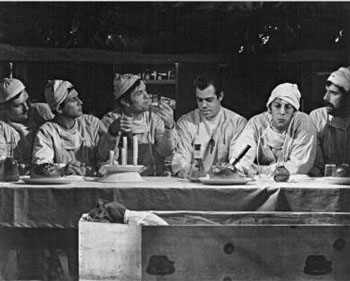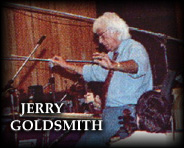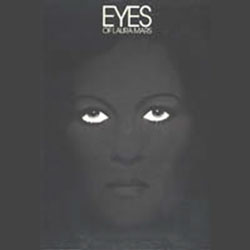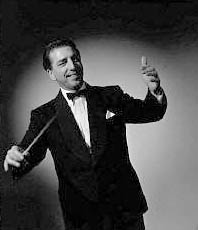| moovymusic!
by Brian McMahon
moovymusic!
moovy -- cuz movies make us who we are (and I mean way down
deep in some very groovy places, baby!); and, integral to
picture is -- music! So much for origins of the name. Now,
do I wax words to a donnish dialectic calculating the degree
to which synergy of score & image sets a film’s
comparative strength/weakness in the cinematic milieu, or
let moovymusic! leap -- boot leather first -- into a www.
ring to ref a commodious calendar of seemingly unfair fights!?
Hmmm ...
SOUNDTRACK
BOUTS / OCTOBER.
M*A*S*H
v. MARRIED TO THE MOB
7 Days In May vs 3 Days of the Condor
M*A*S*H
vs. Married to the Mob.
The MASH soundtrack by Johnny Mandel has it all; a great theme
song, and a -- well, let’s start there. “Suicide
is Painless” is first heard at the opening of the film
as an ironic, upbeat, light-pop-with-chorus-vocal counterpoint
to aerial quick-cuts setting us down somewhere inside war
torn Korea. By the time my ear catches up to the existential
lyric (penned by Mike Altman), I’m riding a stolen army
jeep with stars Donald Sutherland and Tom Skerritt into the
Mobile Army Surgical Hospital where -- excepting for Elliot
Gould’s finagled 2-day golf outing to Seoul -- director
Robert Altman will have us spend the rest of the movie.
About
mid-film the theme’s heard again. This time actors are
assembled to a tableau not unlike the Son-of-God’s Last
Supper for a deliciously blasphemous pre-death ceremony --
it’s a suicide party for the MASH’s well-endowed
Dentist Walt “Painless Pole” Waldowski. Centered
Christ-like amid his fellow doctors, Painless is about to
ingest the “black capsule” -- guaranteed to bring
an end to Walt’s crisis of faith in his own sexual prowess.
Of course, a thematic situation as well wrought as this can
prove hazardous duty for composers; while success can be huge,
so, too, can failure. But Johnny Mandel pulls off the perfect
paean: “Suicide is Painless”. Not only does it
work lyrically for this, the best of the film’s darkly
comic scenes, but the sweet gospelesque solo vocal w/sparse
guitar arrangement renders the tune memorable for a lifetime’s
humming.
In addition to the signature
anthem, excellent original music cues are featured throughout.
Plus, well-chosen popular tunes -- contemporaneous with America
at the time of the Korean conflict -- season dozens of dialogue
bits dubbed off the movietrack of perhaps the funniest war
film ever made. Released during the unfunniest “police
action” ever waged (Viet Nam), the Altman antidote had,
too, the interesting side-effect of aiding and abetting just
about every counter-culture lifestyle conceived in the early
1970’s.
And, no, it doesn’t seem
to bother me that I still haven’t the slightest notion
if this LP works as a stand-alone. Having heard it first in
context with picture, then that same way a dozen times during
its initial theatrical exhibition, subsequent retrospective
showings, and later on VHS -- before ever buying the album
-- I can be no fair judge. But, people, if you’ve not
seen the film and feel that the soundtrack on its own is not
working for you -- well, goddamnit, SEE THE GODDAMN MOVIE!”
Then forever after laugh your ass off.
Oh
yeah, the scheduled opponent in this bout, Married to
the Mob -- the Jonathan Demme picture with Music by David
Byrne -- hasn’t even been seen since the “weigh-in”.
Winner
by forfeit: M*A*S*H!

7
Days In May vs. 3 Days of the Condor.
Fittingly,
I’m reminded of the dice game “Craps” where
7 is a winner and 3 is “craps”. Scored brilliantly,
certainly a winner, Jerry Goldsmith’s “Days in
May” are numbered aptly. As, too, are the “Condor”’s
days, I’m afraid . . . eh, Mr. Dave Grusin. And, well,
that’s the match.
But,
I wonder: Will a terse “round-1” decision trigger
the displeasure of readers who’ve come to expect more
in the way of wordy carnage in their moovymusic reviews? Perhaps,
I can push my “dice” conceit beyond just this
one title fight . . . yes, of course; if there indeed exists
the same kind of qualitative gulf between these composers
with respect to their career contributions as I suspect does.
Then, the numerical analogy may hold allowing me to lend this
lopsided affair by at least a few more paragraphs.
Let’s
see, setting aside for the moment the bane of the “Condor”
score -- electronic instruments given a funk-fusion treatment!
-- I listen through much of Grusin’s oeuvre. Hey, this
all sounds a bit like “work for hire” to me. I’ll
grant you Dave’s got chops; I mean, there’s no
denying he’s been busy in Tinsel Town since the early
60’s, “The Graduate,” “Candy,”
“On Golden Pond,” etc. But isn’t that more
the
reason to fancy him well-cast in the TV series about a prolific
composer who just can’t pass up a fare -- “Hack,
Hollywood”?
Now,
consider “A Patch of Blue,” “The Sand Pebbles,”
“In Like Flint,” “Chinatown,” and
Jerry G.’s winning hands down -- but only if this contest
be judged by notes on staff paper. No, what this bout needs
to keep Dave G. down on the mat for the first time in 40 years
is a definitive knock-out punch! Has his opponent got one?
Well, take a look at the company these guys keep: Scan the
“Condor” soundtrack’s
back cover and note who’s paying the freight for Grusin’s
scoring. Holy shit -- in 36-point
caps -- DINO DE LAURENTIS! On the other hand, Maestro Goldsmith
for “Seven Days in May” invents at the pleasure
of director John Frankenheimer, whose celebrated corpus demonstrates
both a sharp eye for cinema and an ear compeer (sensitive
to both story and score). And, too, Herr Frankenheimer often
mined “gold” out of lesser composers than Jerry
-- i.e., Bill Conti for 1991’s “Year of the Gun”
(a very “electronic” soundtrack, by the by, and
not funked-up). Would that Dave’d hung with John once
in a while! Or once, even.
In closing, my “Thanks”
out to Dino (or responsible parties) for not going with the
original James Grady title: “Six Days of the Condor”
-- it’d surely have been (gulp!) a double album!!

SPECIAL
FEATURES @ moovymusic!
HOUSECLEANING
is a monthly listing of the latest “throwaways”
here at moovymusic!. These are soundtracks, original cast
recordings, or “movie music” compilation albums
whose worth has been reconsidered ... and assessed to be less
than the value of 1/8th-inch more usable shelf space for storing
our burgeoning Wicker Park construction dust collection.
1. RAIN
MAN / Even godly love of Lou Christie and an airy adoration
for his solo track here—a resplendent version of “Beyond
the Blue Horizon”— won’t keep aloft this
cd which may long hover above your trash can as it did mine.
This day, song contributions of lesser performers and the
leaden Jan Hammer score pulled it down.
2. THE
EYES OF LAURA MARS / But what really concerns me are the Ears
of Laura Mars. Oooow !
3. TIMES
SQUARE / Even the cult-spawning teen lesbian love storyline
can be of no consequence here. “Times Square”’s
20 songs by 20 artists soundtrack fast-dissipates any amnesia
that for nigh 20 years allowed you to misrecollect the 1980’s
so pleasantly!
4. COCO
/ Obviously, a star (Katherine Hepburn) vehicle. Like the
Hummer Limo, this soundtrack was never intended to get much
mileage for its many gallons of gas.
5. CAMELOT,
GIGI, MY FAIR LADY, THE LITTLE PRINCE / Hmm, there must be
something common to all these musicals that has me chucking
the lot at once. A-ha, Lerner & Lowe!
6. ARTHUR
(The Album) / Burt should’ve taken the 1980’s
off like I did.

SOUL
COAXING
Featuring:
Jackie Gleason (Music for Lovers Only / Capitol,1953),
Peter Nero (Young & Warm & Wonderful / RCA,
1962), Nelson Riddle (101 Strings / Alshire, 1970),
Mantovani (Golden Hits / London, 1966), and more!
If . . . and I say if . . . I confess a craving for the easy
listening music of my forebears, then I won’t blanch
when you call me its crack baby -- junk sick for the 1950s.
Nor wilst I wither when whispers adduce that I rifle moldy
thrift store album stacks for a taste of the same wall treatments
as papered the rooms of my childhood. Fairly find me desperate
to recreate those 1960's pastel-painted & pop-patterned
suites of pleasing tranquility from which I fled screaming
into the waiting arms of my beloved Electric Eels way-back-when
and I shan’t stickle your twit: “McMahon now dredges
the dregs of discarded discs for the very vinyl-y slabs which
dropped in layers off the record changer of his parents' phonograph
console!”
But, hold
on -- I make no such confession. Therefore, make no such findings!
For, certain distinctions in the entire matter immediately
impress me, as they should you: If it be by the hand of Mother
Dearest that I am so addicted, then where is the Mitch Miller,
the Ed Ames? Nor am I in the market for Lombardo, Luboff,
nor any of the other drugs, er, listening preferences of Good
Old Dad! You must conclude then, as I have, that my passion
for the genre is both select and unrelated to the circumstances
of my birth and upbringing.
Comes
old friend and ex-Eels guitar player John Morton: different
family background; different private schools; different interior
decorator -- does the milieu of his childhood or the ambience
of early adolescence explain the kind of stuff that's been
on his turntable lately? He doesn’t say. Instead, Morton
recommends "Mantovani and Gleason" to me. To which
I return "Faith and Previn". Suddenly, we’re
speaking in tongues. Dead language? No, it’s more like
an abandoned dialect: a dusty, idiomatic skeleton-key to a
veritable treasure chest of forgotten rites and mysteriously
wonderful involutions. Like Latin unlocks the liturgical cache
that is the Catholic Church, our exchange of rapid-fire references
to "good music" personalities soon has us swooning
amid the thick incense clouds of a kind of easy-listening
high mass! Before we know it’s happening, collateral
citations of the individual works of worthy composer / arranger
Nelson Riddle have segued us seamlessly, effortlessly, into
our first truly-substantial post-Eels conversation in more
than 15 years!
In the
days following, several theories are tried and rejected by
me in an effort to explain how John and I, estranged for these
many years, could have come by different routes to the same
end -- a dénouement odious in the eyes of the punk
world which yet holds our oeuvre in no little esteem: he,
now a tardy aficionado of Lawrence Welk; I, a late-to-the-party
fan of Peter Nero! Coincidence? More chance that than we were
by some master plan infected -- pricked with the same stylus!
Science may have the explanation: Identical toxins hiding
in the blood awaiting cracks in our immune systems attacked
with a kinda case of musical shingles. But what odds the virus
would’ve struck us at the same time? Still, we do seem
a pair doomed -- destined to ride out the rest of our lives
in the same . . . elevator.
So, I
play the Mantovani. And it hits me: This shit's way bigger
than what I’ve been listening to. Too damn big. And
Gleason is so, uh, soft-focused that he’s downright
creepy! Hey, I like eerie, but Jackie’s in the ghoul
squad with Winterhalter and Weston. And, John, please don't
even ask me to reconsider Ray Conniff. As I'm tracking Welk
alongside my Nero, I’m realizing that while Morton and
I are
definitely not alone in our appreciation of easy listening
music (millions have been sold!), we're also, decidedly, NOT
on the same elevator.
I flip
through my recent acquisitions: Gordon Jenkins, Burt Bacharach,
Les Baxter -- for me, THESE are antidotes to the airport ether
of Earl Klugh and George Winston; rescue from the phone-hold
tortures of Lee Ritenour and Bob James; therapy to the lobby
lobotomies of Larry Carlton and the Yellowjackets. I figure
it all comes down to how strong a cocktail one needs mix to
counter the deleterious effects of 25 years of saturation-bombing
by the worst exemplars of late 20th-century muzak. And, hey,
if you’ve not been around that long, probably you don’t
need the service . . . and you don’t have my gout either.
In closing,
I dub Mantovani the heroin of mood music: John may need it
— others may need it — I don't. Okay, once in
a while I chip—but, usually, just make mine a Mancini
. . . neat. Gleason’s a fistfull of psychotropic drugs
far as I'm concerned; if you worry like I do about overmedicating,
try some Michel Legrand. And, finally, regarding Nelson Riddle,
I only paraphrase Steve Buscemi's simple plaudit of Jose Feliciano
in Fargo: “you really can't go wrong with Nelson
Riddle.” Even here, though, I attach a caveat emptor.
Just because you see the name of a favorite composer/arranger
in a particular label’s catalog, don’t assume
you’re not getting a placebo: Remember, no drugs can
be worse than too many!

MANTOVANI: "The
heroin of mood music . . ."

|
![]()